Building a Sports Card Collection on a Budget
Building a sports card collection can be an exciting yet challenging endeavor, especially when one is trying to remain within a specific budget. The process requires not only strategic planning but also the implementation of various tactics that can help in growing your collection efficiently and cost-effectively. In this comprehensive article, we aim to guide collectors, both novice and seasoned, through a range of tips and strategies designed to enhance their sports card collection. We'll delve into methods of identifying value-for-money purchases, optimizing trading opportunities, and leveraging community resources. Furthermore, we'll discuss how to stay informed about market trends and make savvy decisions that can expand your collection without imposing a financial strain. Whether you are a beginner starting with a modest budget or an experienced collector looking to refine your approach, our insights will equip you with the knowledge and tools needed to build an impressive sports card collection while keeping your finances in check. Explore our affordable sports card backpacks, designed for collectors on the go. Keep your collection secure and organized wherever your passion takes you!
Set a Sports Card Budget and Stick to it
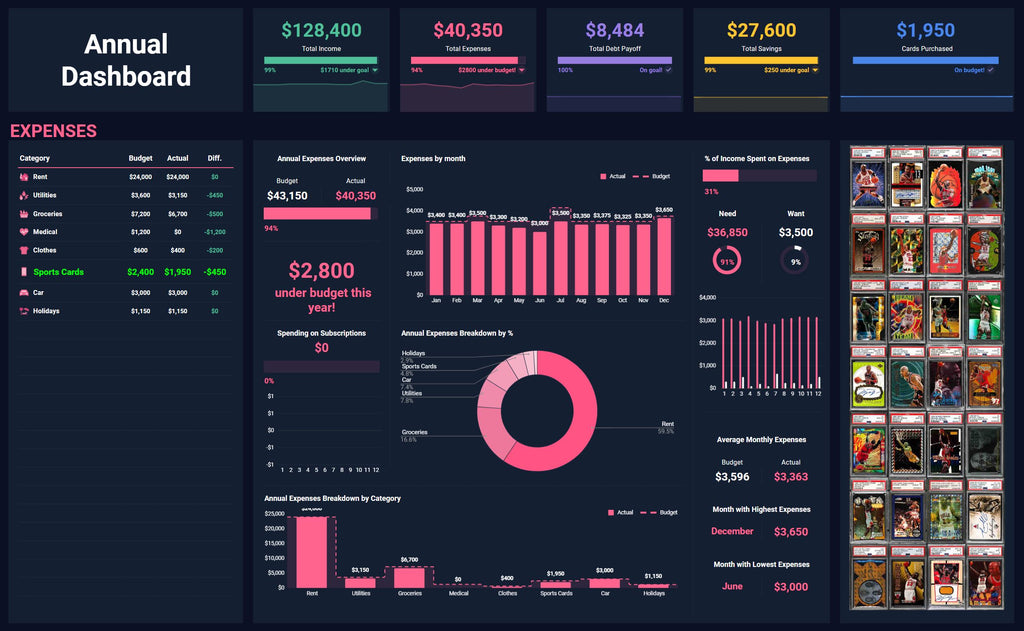
Setting a budget and sticking to it is fundamental when starting a sports card collection, especially if you're working within financial constraints. The process begins with a realistic assessment of your financial situation. Consider your regular income, essential expenses (like rent, groceries, and utilities), and any other financial commitments you have. From what remains, decide how much you can comfortably allocate to your hobby each month without affecting your essential needs.
It's helpful to think of this budget as a fixed expense, similar to a subscription or a savings plan. Once you set this amount, discipline is key. Treat this budget as a hard limit to prevent overspending, which can lead to financial stress or debt. To manage this effectively, you might want to set up a separate bank account or a dedicated savings jar for your sports card fund.
This budget will also serve as a guide for making purchasing decisions. It forces you to prioritize and make strategic choices about which cards to add to your collection, encouraging a more thoughtful and selective approach. For instance, you may decide to skip certain releases or wait for the right price on a sought-after card.
Furthermore, consistently sticking to a budget can have long-term benefits. It allows you to gradually build your collection without financial strain, and it encourages a sustainable approach to collecting. Over time, as your financial situation or priorities change, you can adjust your budget accordingly.
Start With Common Sports Cards and Work Your Way Up

Beginning your sports card collection with commons, the most basic and widely available cards, is a practical approach, particularly when you're operating on a tight budget. While the allure of rare and valuable cards is strong, they often come with a hefty price tag that may not align with your financial constraints. Commons, on the other hand, offer several advantages for a budding collector.
Firstly, the affordability of common sports cards makes them an excellent entry point into the hobby. These cards are much less expensive than their rare counterparts, allowing you to acquire a larger number of cards for the same amount of money. This is particularly beneficial when you're just starting out and looking to build a foundation for your collection.
Additionally, commons are often available in bulk purchases, where you can obtain a large quantity of cards at a significantly reduced price per card. This can be an economical way to quickly expand your collection. Bulk purchases also sometimes contain hidden gems or cards that may increase in value over time, offering an element of surprise and potential future gain.
Another advantage of starting with commons is the opportunity to learn about the hobby without a significant financial risk. As you handle and sort through these cards, you gain a deeper understanding of different card types, conditions, and what you personally enjoy collecting. This knowledge is invaluable as you progress in the hobby and start to invest in more expensive cards.
Collecting commons also allows you to explore various aspects of the sport and its history. You can discover new players, teams, and eras, broadening your appreciation of the sport and its memorabilia.
As your collection grows and your budget allows, you can then start to include more rare and valuable sports cards. This gradual approach not only keeps your spending in check but also gives you a clear goal to work towards. It can be highly rewarding to upgrade your collection over time, starting from humble beginnings and evolving into a more prestigious assembly of cards.
Look for Deals and Discounts on Sports Cards
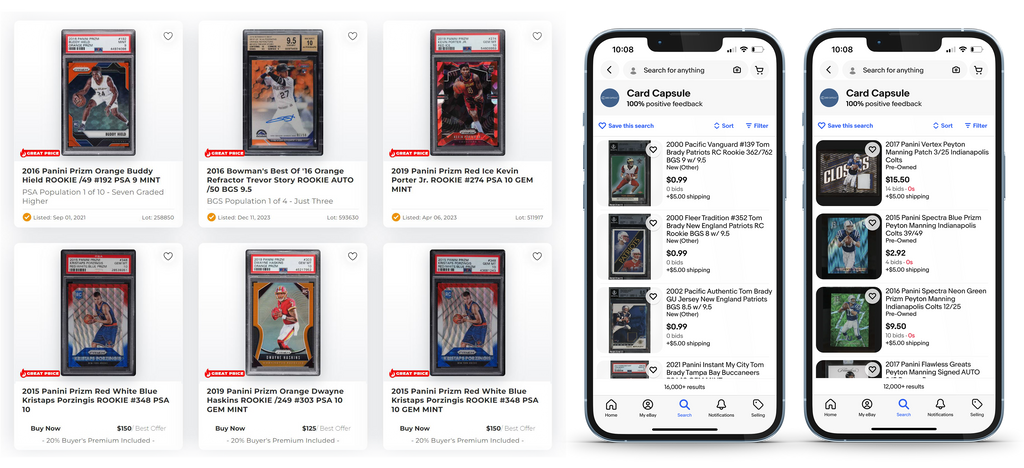
Actively looking for deals and discounts is a highly effective strategy for saving money while building a sports card collection, especially when working with a limited budget. The sports card market offers various opportunities for cost-saving purchases if you know where to look and how to take advantage of them.
Firstly, local card shops can be a treasure trove for deals. These shops often have sales, especially during off-peak seasons or when they need to clear out inventory. Building a relationship with the owners or staff can also be beneficial; they might offer you special deals, notify you of upcoming sales, or even hold desirable cards for you. Don't hesitate to negotiate prices in these shops, as there's often some flexibility, particularly for regular customers.
Online marketplaces and auction sites are another excellent source for discounted cards. Many online retailers offer periodic sales, coupon codes, or discounts on first-time purchases. Additionally, auction sites can sometimes yield great deals, particularly for lots that contain multiple cards. However, it's important to be vigilant about the condition and authenticity of the cards when buying online.
Bulk purchases are an often overlooked yet effective way to save money. Buying cards in bulk typically results in a lower cost per card. These lots can include a mix of commons and potentially a few rarer cards. While bulk purchases might contain many cards you don’t need, you can trade or sell these duplicates to recoup some of your investment or fund future purchases.
Keeping an eye on promotions and discounts requires some effort. Regularly check the websites of your favorite card shops and online marketplaces, and consider subscribing to their newsletters or following them on social media for the latest updates. Joining online forums and communities dedicated to sports card collecting can also be beneficial. Members often share tips about current deals and promotions, and you might even find opportunities for group purchases, which can further reduce costs.
Remember, patience is key when looking for deals. Waiting for the right sale or discount can mean significant savings compared to impulsive purchases at full price. Additionally, always calculate the true value of a deal by considering factors like shipping costs or the likelihood of needing certain cards in a bulk lot.
Buy Graded Sports Cards
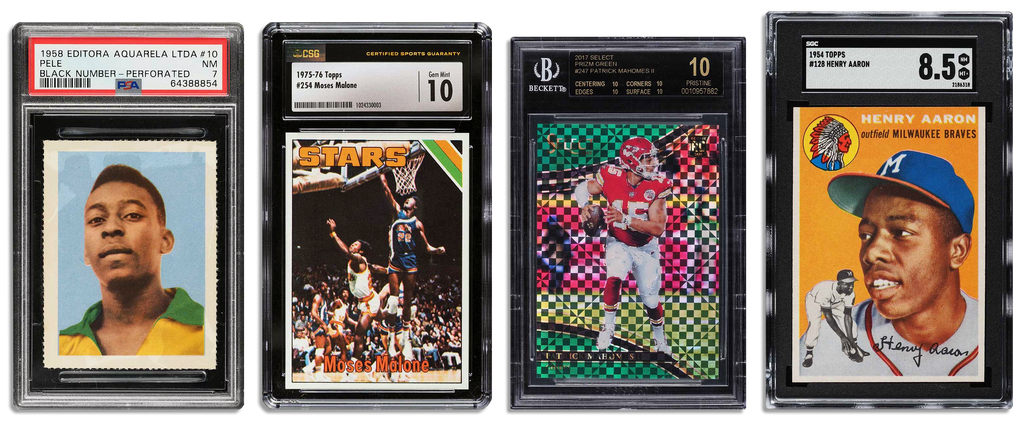
Graded cards are an important aspect of sports card collecting, especially for those looking to build a valuable and long-term collection. These cards have been professionally evaluated and rated for their condition by reputable third-party grading services. The grading process involves a detailed examination of the card's corners, edges, surface, and overall condition, culminating in a condition grade that significantly impacts the card's value.
One of the key benefits of graded cards is their potential to maintain or increase in value. Since their condition has been professionally assessed and documented, these cards are often more sought-after in the collector's market compared to ungraded cards. The grade provides a level of assurance about the card's condition, reducing the uncertainty that can come with ungraded cards. This can be particularly important for rare, vintage, or highly valuable cards, where the condition greatly influences the overall worth.
Graded cards can indeed be more expensive upfront than their ungraded counterparts. This is due to the added value of the grading itself – the process of professional evaluation, encapsulation, and certification. However, this initial higher investment can be justified by the increased ease of resale and potentially higher resale value. Graded cards are often more attractive to serious collectors and investors, who are willing to pay a premium for cards with a guaranteed and verifiable condition.
Another advantage of graded cards is the protection and preservation they offer. Once graded, cards are typically sealed in tamper-evident, clear plastic cases, protecting them from physical damage and environmental factors like moisture or sunlight. This preservation is crucial for maintaining the card's condition over time.
For collectors interested in long-term investment or building a high-quality collection, focusing on graded cards can be a wise strategy. It's important to choose a reputable grading service, as the reputation and reliability of the grading company can also affect the perceived value of the card. The most recognized grading services in the sports card industry are PSA (Professional Sports Authenticator), BGS (Beckett Grading Services), SGC (Sportscard Guaranty Corporation) and CGC (Certified Guarantee Company). Safeguard your valuable cards with our durable trading card cases and baseball card slab cases. Shop now and find the perfect storage solution for your growing collection!
Consider Alternative Types of Trading Cards
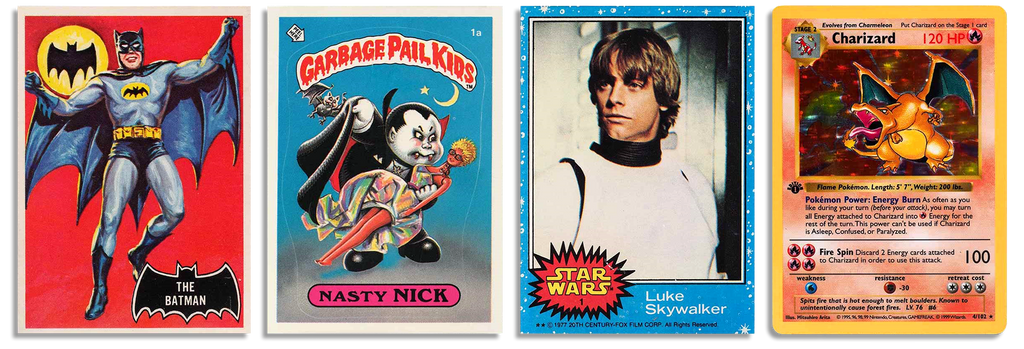
If you find yourself facing challenges in acquiring affordable sports cards, exploring other card collecting avenues can be a rewarding and cost-effective alternative. Non-sports cards, encompassing categories like entertainment, gaming, historical events, and more, offer a vast and often more accessible world for collectors.
Entertainment cards, for example, can include a wide range of subjects from popular movies, TV shows, and celebrities to niche interests like classic films or specific genres. These cards often come with a lower price tag compared to sports cards, especially for recent releases or less sought-after series. Collecting entertainment cards allows you to connect with your favorite shows, movies, and personalities, offering a different kind of excitement and personal satisfaction.
Gaming cards, such as those from collectible card games like Magic: The Gathering, Pokémon, and Yu-Gi-Oh!, are another popular collecting area. While some rare gaming cards can be quite valuable, there are many sets and individual cards that are very affordable. Gaming cards also add an interactive element to your collection, as they are designed to be played in card games. This can introduce a social aspect to your hobby, where you can meet other players and collectors.
In addition to these, there are cards for virtually every interest. Historical cards might feature significant events, historical figures, or even technological advancements. Science fiction, fantasy, and comic book cards are popular among fans of those genres. There are also educational cards, which can be both fun and informative.
Branching out into these other types of cards can also offer a refreshing change of pace. It can be exciting to explore new themes and types of collections, and you might discover a passion for a subject you hadn't considered before. The communities surrounding these different types of card collections can be welcoming and informative, offering new friendships and learning opportunities.
Moreover, non-sports cards often have their own unique aesthetics and design elements, which can be a delight to explore. Some collectors find joy in the artwork and creativity displayed in these cards, adding an artistic appreciation to the hobby.
Trade Sports Cards With Other Collectors

Trading with other collectors is a cost-effective way to enhance your sports card collection. It involves swapping cards you have in excess or don't need for cards that fill gaps in your collection, thus acquiring new cards without spending money. This method is particularly beneficial for managing duplicates or redirecting your collection's focus.
You can connect with potential trading partners through various channels. Online forums and social media groups dedicated to sports card collecting are prime platforms for finding trade opportunities. These digital spaces allow you to engage with a broader community, post your available cards, and see what others are offering.
Local card trading groups and events offer another avenue for trades. Participating in these local communities allows for face-to-face interactions, enabling you to assess card conditions directly and build personal connections with fellow collectors.
Trading is not just a transaction; it's a community engagement that requires fairness and clear communication. It's important to be transparent about the condition and value of the cards being traded to maintain trust within the trading community.
In essence, trading is a mutually beneficial and interactive way to grow your sports card collection, allowing for both the refinement of your collection and the opportunity to engage with fellow enthusiasts.
Use Social Media to Find Deals on Sports Cards

Social media platforms are invaluable tools for sports card collectors looking for deals and networking opportunities. By following card dealers and collectors on platforms such as Twitter, Instagram, and Facebook, you can stay informed about special offers, discounts, and new releases. Dealers and collectors often post exclusive deals or flash sales on these platforms, offering opportunities to purchase cards at lower prices.
Additionally, social media is an excellent way to connect with the wider collecting community. You can join groups or follow pages dedicated to sports card collecting, where members frequently discuss their collections, trade cards, and share insights about the market. These interactions not only provide opportunities for acquiring new cards but also foster a sense of community and shared knowledge among collectors.
Buy from Reputable Sellers

When purchasing sports cards, prioritizing reputable sellers is crucial to ensure authenticity and value. Opt for sellers who have established a positive reputation in the market. This can be assessed through their track record and customer feedback. Sellers with consistent positive reviews are more likely to provide genuine, high-quality cards.
Be cautious with unknown sellers or those with significant negative feedback. Transactions with such sellers carry a higher risk of encountering counterfeit or misrepresented cards. Engaging with reputable sellers not only safeguards your investment but also enhances your overall collecting experience.
Focus Your Collection on a Specific Player or Team
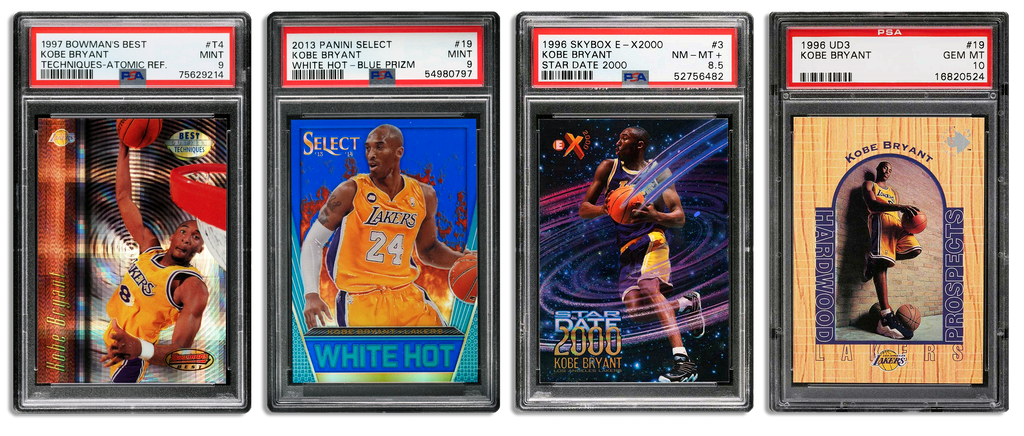
Concentrating your sports card collection on a particular team or player is an effective strategy for affordability and uniqueness. This focused approach allows you to channel your resources and efforts into acquiring cards that are most meaningful to you, reducing the temptation to spend on less relevant cards. By narrowing your scope, you're not only managing your budget more efficiently but also creating a collection with a clear theme.
This specialized collection can potentially become more valuable and distinctive over time. Collections centered around a specific team or player often appeal to like-minded collectors and can hold special significance, especially if they include rare or unique items related to that theme.
Attend Local Sports Card Shows and Conventions

Card shows and conventions are excellent venues for collectors looking to find deals and broaden their sports card collections. These events typically feature a diverse array of cards, ranging from common to rare, providing a unique opportunity to browse a wide selection in one place. Vendors often offer special discounts and deals exclusive to the event, allowing for cost-effective purchases.
Beyond the potential for finding great buys, card shows and conventions are also valuable for networking. They provide a platform to meet other collectors, share insights, and engage in trades. This social aspect of card collecting can lead to fruitful exchanges and lasting connections within the collecting community.
Buy Raw Sports Cards and get them Graded
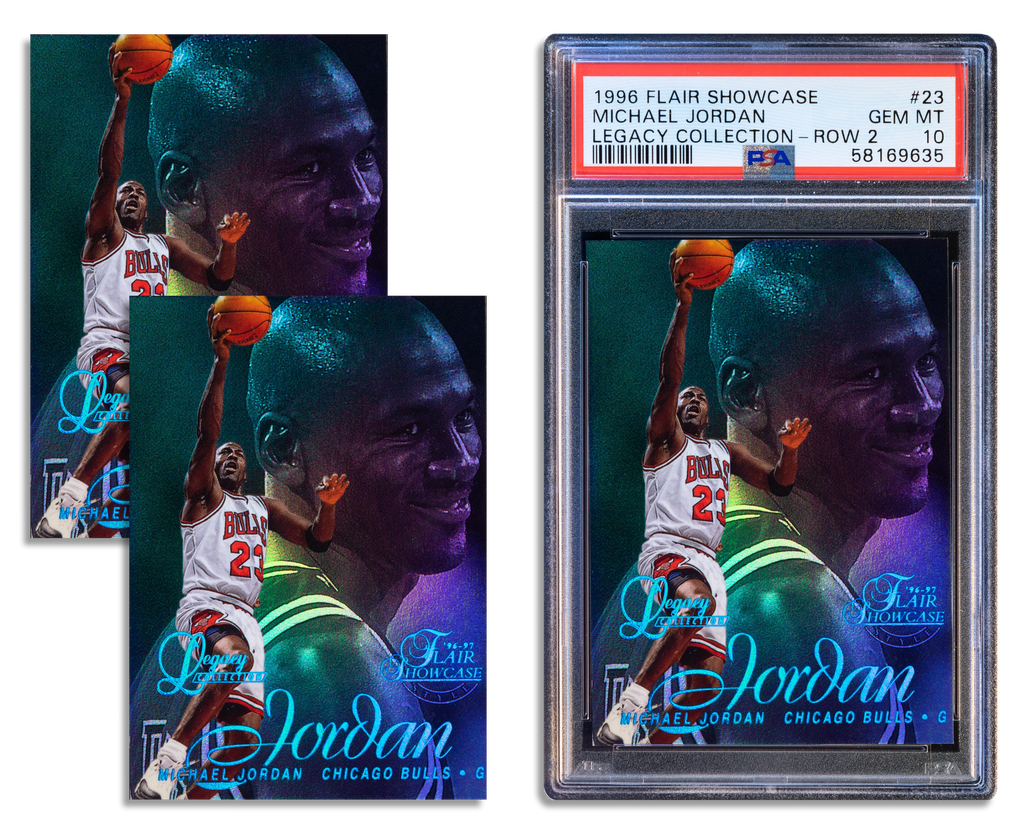
Raw cards, which are ungraded and not sealed in protective cases, present a more affordable option compared to graded cards. Opting for raw cards can be a cost-effective strategy, especially if you have the ability to assess their condition accurately. Buying raw cards and later getting them graded yourself offers potential savings, as ungraded cards are often priced lower due to the absence of a professional grading premium.
However, this approach involves some risk. The grading process can be subjective, and there's no guarantee that a card will receive a high grade. If a card is graded lower than expected, its value might not increase as anticipated. Therefore, this strategy is more suitable for collectors who are willing to accept the uncertainty in exchange for the potential cost savings.
Don't be Afraid to Negotiate for Sports Cards
Negotiating the price when buying sports cards can lead to significant savings and is a common practice in the hobby. Sellers, especially those at live events or in personal transactions, are often open to negotiation, particularly for larger purchases or bulk deals. Don't hesitate to make a reasonable offer on cards you're interested in; many sellers are willing to consider lower prices to secure a sale. This approach can be especially effective in person, where direct interaction allows for immediate discussion and bargaining.
Conclusion
Navigating the world of sports card collecting within a budget is both an exciting and achievable endeavor. By implementing a mix of strategic planning and practical tactics, collectors, whether they are just starting out or are well-versed in the hobby, can effectively grow their collections. Key to this process is adhering to a predetermined budget, starting with more affordable common cards, and actively seeking out deals and discounts. Emphasizing the value of graded cards, exploring the diverse world of non-sports cards, and engaging in trades can also significantly enhance a collection. Additionally, harnessing the power of social media, buying from trustworthy sellers, focusing on specific teams or players, attending sports card shows, and considering the potential of raw cards all contribute to a more rewarding collecting experience. Finally, the art of negotiation can open doors to greater savings and opportunities. With these strategies, collectors can expand their sports card collections, enjoying the rich history and community of the hobby while maintaining financial health.
Looking for premium protection for your prized cards? Browse our trading card cases and baseball card slab cases to ensure your collection stays in mint condition!



I really enjoyed reading this article! I learned a lot here. Thank you for motivating me and giving me some fresh ideas!
Leave a comment